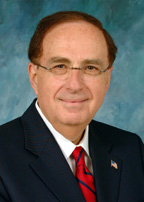 UNMC will come through the latest round of budget cuts without losing its trajectory toward becoming a world-class academic health sciences center, Chancellor Harold M. Maurer, M.D., told employees Thursday.
UNMC will come through the latest round of budget cuts without losing its trajectory toward becoming a world-class academic health sciences center, Chancellor Harold M. Maurer, M.D., told employees Thursday.
“We will continue to be an academic medical center on the move,” Dr. Maurer said. “That’s our position.”
Dr. Maurer addressed faculty and employees at two forums Thursday, detailing his budget-cutting proposals for this fiscal year. The $3.07 million in additional cuts were made necessary when lawmakers, during a July special session, decreased the University of Nebraska’s 2002-2003 appropriation by $15 million.
On Thursday, Dr. Maurer told employees that UNMC would cease funding 23.6 full-time equivalency (FTE) positions from state general funds. Of those, 17 FTEs are filled. Some of those – including the 11.5 FTE employees in Biomedical Communications – likely will maintain their jobs as their salary funding comes through other sources. The alumni office, which also will lose state general fund support, will seek outside financial support, as well, Dr. Maurer said.
“I’m confident that support for the Alumni Office can be found,” he said.
Dr. Maurer described the outcome of these cuts as “relatively easy,” when compared with what may occur after lawmakers take action in the 2003 Legislative session, which will begin in January. Unicameral members will pass the 2003-2005 biennial budget during that session, and state economic forecasts predict that revenues will fall $500 million short of earlier projections. The university may be a target again, Dr. Maurer said.
He said that employees, when they come in contact with legislators and other leaders, should help them understand the impact of an academic medical center, specifically UNMC.
“Very few people in Nebraska — outside of this Medical Center — understand what an academic medical center is,” Dr. Maurer said. “We educate health-care practitioners. Those health-care practitioners then go into their communities and become economic drivers.”
Dr. Maurer gave the example of Cozad, which he visited recently. The town of 3,000 people has 31 health-care professionals who graduated from UNMC, Dr. Maurer said. Those professionals drive Cozad, economically, and provide essential services to the city.
Employees also can help the campus in its effort to conserve energy. UNMC hopes to save $500,000 through energy conservation during the current fiscal year. Dr. Maurer quipped that the chancellor’s office has become dark, even during the day.
“This is our home for eight hours a day, at least. We should treat it like our home. When you leave the room, shut the light off,” Dr. Maurer quipped.